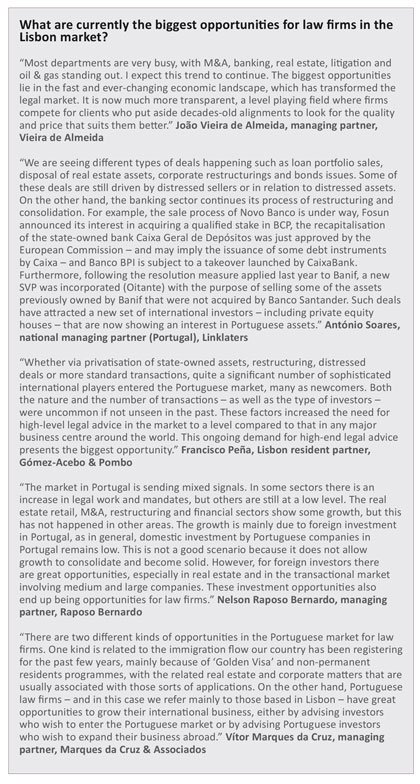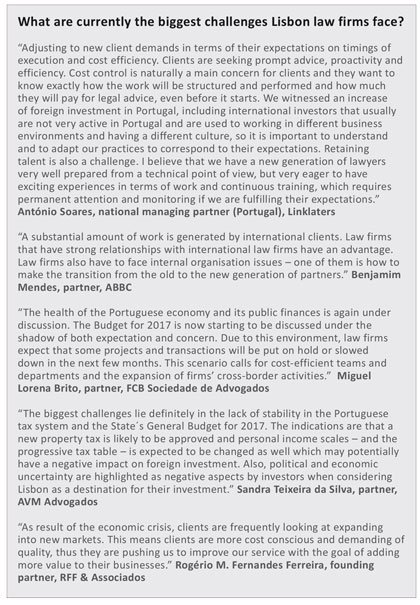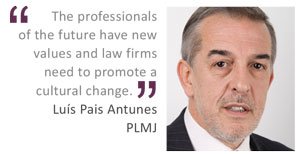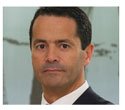Lisbon annual report 2016: Darkening clouds?
In the short term, banking and finance-related work will sustain many law firms in Lisbon, but the longer term outlook is more uncertain and legal market consolidation is looking likely
Banking and finance-related work will be the lifeblood of Lisbon’s law firms for some years to come. The country’s financial institutions have not yet eradicated all of their problems and, in addition to the expectation that the banking sector will undergo a further period of consolidation, lawyers will also be able to feed off the plentiful finance-related litigation that is currently ongoing. But while law firms’ prospects look good in the medium to short term, the outlook for the long term is less certain. Lisbon lawyers have benefitted from the global financial crisis as their firms have steadily grown revenue, but if the day comes when the Portuguese economy finds itself on a firmer footing, a number of firms could find themselves starting to struggle. Indeed, some lawyers predict that, despite the plentiful legal work available, some Lisbon firms will be forced to merge much sooner – perhaps even in the next year – in order to remain viable entities.  Managing partners are also bracing themselves for the prospect of the ‘Big Four’ consultancy firms upping their efforts to muscle into the Portuguese legal market. In what way will they do this? It’s unclear at present, but the fact that Deloitte welcomed Lisbon firm CTSU – Sociedade de Advogados into its legal network in the last year, perhaps gives us an indication of the strategy they will adopt. Indeed, senior figures in the legal market expect two other members of the ´Big Four’ to make significant moves in this respect in the coming 12 months.
Managing partners are also bracing themselves for the prospect of the ‘Big Four’ consultancy firms upping their efforts to muscle into the Portuguese legal market. In what way will they do this? It’s unclear at present, but the fact that Deloitte welcomed Lisbon firm CTSU – Sociedade de Advogados into its legal network in the last year, perhaps gives us an indication of the strategy they will adopt. Indeed, senior figures in the legal market expect two other members of the ´Big Four’ to make significant moves in this respect in the coming 12 months.
Unsolved problems
Banking and finance-related matters are creating considerable opportunities for lawyers, according to Antonio Villacampa, partner at Uría Menéndez. He adds that the Portuguese financial sector has not solved its problems and highlights the problems surrounding the proposed privatisation of Novo Banco. In addition, Villacampa adds that there is also a significant amount of M&A, litigation and restructuring work.
Paulo Câmara, managing partner of Sérvulo & Associados, says law firms are experiencing an increase in workload in the areas of real estate and data protection. He adds that the “pressing need” for banking sector consolidation will also create opportunities for lawyers. Câmara says that new players – particularly venture capitalists – are targeting investments in the Portuguese market.
Real estate and tax-related matters are creating a lot of work for lawyers in Portugal, according to Caiado Guerreiro managing partner João Caiado Guerreiro. He also says that lawyers are receiving plenty of instructions in relation to the restructuring of the financial sector, and fintech in particular. Abreu Advogados founding partner Miguel Teixeira de Abreu says that, while Portugal is not a market that generates major M&A work, there is currently a real estate boom in the country: “There are a lot of family offices investing in real estate, and I think the real estate prices have considerable potential for growth.” In general, Teixeira de Abreu says opportunities for M&A work for law firms in Portugal are declining as the market reduces in size. He continues: “Over the past years, a lot of the work has been related to damage control, such as insolvency matters, restructuring and reorganisation.” Meanwhile, CCA Ontier partner Domingos Cruz says there is a shift in Portugal to more innovative industries, which is generating a lot of foreign investment. He adds that this trend is creating plenty of opportunities for law firms.
 Paying the right price
Paying the right price
Pricing is currently a major challenge for law firms in Portugal, according to one partner at a Lisbon firm. He adds: “Law firms are growing, but Portugal has the lowest hourly rates in Western Europe.” In general, demand for legal services is growing in Portugal, according to Nuno Azevedo Neves, partner at ABBC. “It’s now about managing the growth and the profitability of firms, but having growth and having profitability are different things with different challenges,” he adds. “The world, and the way business is done, is becoming more complex, but crises are also opportunities, both in the domestic market and in outbound work, which represents a particularly big opportunity.”
Nuno Galvão Teles, managing partner of MLGTS, says that one of the biggest challenges for law firms is how to manage people. He adds: “The younger generation of lawyers are different from previous generations, work-life balance is more important to them.” Retaining talent is one of the key issues for law firms, says Rodrigo Almeida Dias, partner at FCB Sociedade de Advogados. He continues: “There is also pressure to reduce fees so the challenge [for law firms] may ultimately be to keep a good economic balance and not increase bank debt.”
Luís Pais Antunes, managing partner of PLMJ, says a key challenge facing law firms is “attracting and retaining talent”. He adds: “The professionals of the future have new values and law firms need to promote a cultural change.” One partner remarks that managing young lawyers is a “major difficulty”. He adds: “It used to be that young lawyers wanted to be litigators or criminal lawyers, but now they want to do different types of law, they want to have a life outside the office. I’m very worried about how to deal with these guys – there used to be a degree of predictability in the way you managed young lawyers.” João Vieira de Almeida, managing partner of Vieira de Almeida, says it is not possible to categorise all young people as “one generation”. He adds that young lawyers “don´t want to die in the firm, but they are hardworking, focused and highly motivated and some want to make partner”. One partner highlights some of the tensions between older and younger generations at law firms, citing the example of some older partners at firms wanting to institute start times – that is, a time when lawyers should arrive at the office – but “millennials” wanting to be more flexible. “Managers of law firms have to adapt,” he adds.
Gender equality
Transparency and clarity are highly valued by the new generation of lawyers, according to Cuatrecasas, Gonçalves Pereira’s Portugal managing partner Maria João Ricou. “They want to know what the plan [for the firm] is and what the future is for them,” she adds. Ricou says that consequently, law firms need to improve the level of information they provide young lawyers. She continues: “There is a desire for new models of work, with more gender equality and flexibility and greater use of technology – I believe this shift will make our firm stronger and better prepared for the challenges the legal market will be facing.”
Gonçalo Anastácio, partner at SRS Advogados, acknowledges that it is now more difficult for most law firms to make new partners. Consequently, some lawyers say it is more difficult to manage younger lawyers. However, there is a consensus among lawyers that there are very few jobs in Portugal where young people can earn more money than they would working at a law firm. One partner at a Lisbon firm says law firms cannot tell young lawyers that they will “become a partner in ten years”, for example. He adds: “They still want to become lawyers, but they don’t want to specialise and they are more prepared to adapt.”
 Dual qualification
Dual qualification
João Miranda da Sousa, partner in charge of Garrigues’ Portugal practice, says young people want “mobility” in their careers. He adds: “There is rigidity [in the legal profession], we are too restricted by the boundaries of our own jurisdiction. In Spain, England and France, there is a greater possibility of dual qualification.” Miranda da Sousa adds that there have been “preliminary exploratory talks” with universities in Portugal and in Spain about increasing the opportunities for Portuguese and Spanish lawyers to become dual qualified to practice in both jurisdictions.
Lawyers also anticipate that two members of the ‘Big Four’ consultancy firms will make “significant moves” in the Portuguese legal market in the coming year. In the last year, six-partner law firm CTSU – Sociedade de Advogados joined the Deloitte Legal Network. Despite anticipated competition from the ‘Big Four’, there is considerable optimism among some partners. Vieira de Almeida says: “Portugal has some of the most resilient law firms in Europe and a number of leading firms will move to new premises in the next year – the challenge is to manage to change in the economic landscape.” Anastácio adds that there is likely to be some consolidation among Portuguese law firms in the coming year.
“The legal market is performing well,” says one partner at a Lisbon firm. “I think there will be even better performance in the medium term, though in-bound work could suffer if there is a negative perception of the Portuguese government.” Meanwhile, the political situation in Mozambique and Angola is a concern for some lawyers, with some saying that Portuguese law firms need to begin targeting new jurisdictions to compensate for potential decreases in revenues from Lusophone Africa. One partner says: “All of our [Portuguese firms’ key] international markets are in bad shape.” He adds: “If the left-wing parties in Portugal achieve a consensus, centrist parties might not get back into power.”
Of concern will be the fact that some lawyers at leading law firms in Lisbon have grave doubts about their organisations’ ability to change in the face of new technological innovations. One partner remarks: “My main concern is that we like to say we are adapting to new technology, but I’m not sure firms are really prepared for it.”
With regard to the future, the diminishing loyalty of clients is another worry. One managing partner remarks that a key challenge is clients’ greater desire to switch between legal providers. He adds: “Fifty per cent of our clients change every year.”












